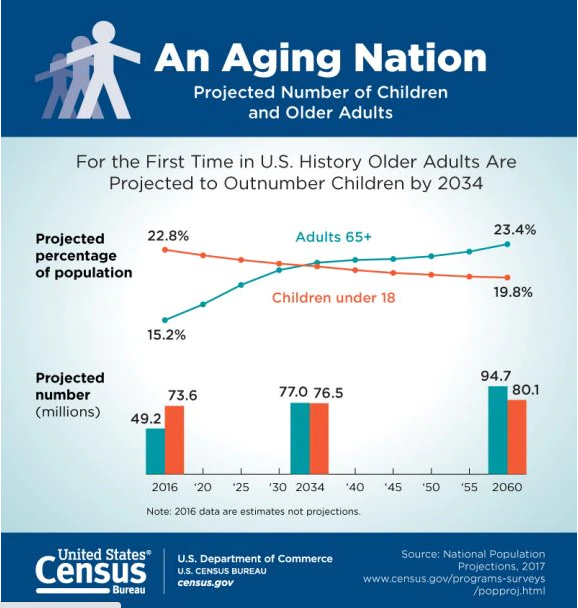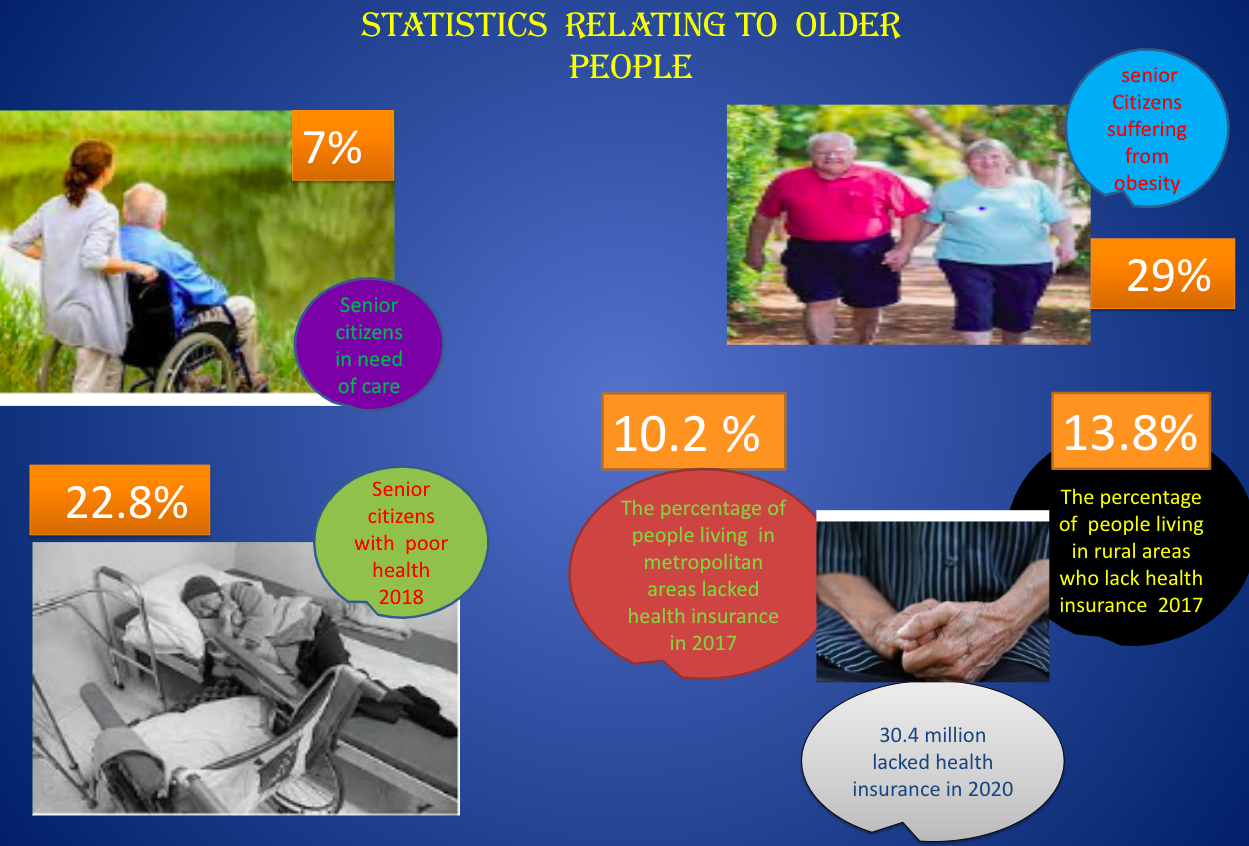Overview of increase in population of older people
The number of older people in the population is increasing, and there are different projections that various institutions provide. According to data from the Statista research department, the older population in the United States will increase from 16.5% recorded in 2019 to 22 % in the year 2050. This projection shows that the number of citizens in the population will be more than the younger people.

The trend is not only in the United States but also in a global trend with the number of older citizens expected to increase. This expected increase in the number of older people in the population is because of the falling birth rate in countries including the United States. The reduction of poverty levels among senior citizens is also a contributing factor in increasing their life expectancy. During the last 40- 50 years, the poverty rate in the c-economy has reduced, greatly impacting the way of life of individuals as they can live better
Statistics relating to Older People

Several challenges and problems accompany the increase in the number of older citizens in the population. With the economies that cannot sustain the large population, individuals experience challenges accessing better health care, food, education, income, and other important social amenities. Healthcare disparities are a challenge that the senior citizens in the population experience. According to the center for disease control and prevention, health disparities are preventable differences in the burden of disease, injury, violence, or opportunities to achieve optimal health experienced by socially disadvantaged populations.
The number of persons lacking health care insurance has been increasing since 2017. According to data from the Statista research department, in 2017, 13.8% of Americans living outside the metropolitan areas did not have health insurance coverage which affected their access to healthcare. 10.2 % in metropolitan areas also lacked health care insurance. In 2020 more than 30.4 million people in the United States had no health insurance cover (U.S. Census Bureau, 2020). The number of older persons in the population aged 65 and above who were in poor health was 22.8% in 2018 and increased. Those aged 65 and over who needed help with personal care were 7 % in the same year. In 2020, the number of individuals aged 65 and above in poor health, especially those suffering from obesity, increased to 29 % (Statista, 2021).
Unique challenges to access to healthcare by senior citizens
The lack of health insurance cover, some of the older citizens in the economy who come from minority groups lack adequate health insurance (Almeida et al., 2017). They led to instances where these people delay going to get healthcare services that might are usually expensive. The lack of insurance and their economic conditions make it hard for these senior citizens to get proper medical care.
Access to medical care facilities is a challenge for older citizens, especially those living in rural areas (Almeida et al., 2017). There is a difference in accessing health care facilities for those in urban areas and those living in rural areas because of the ease in available transportation services. In the rural area, senior citizens find it hard to visit health care facilities that are located a long distance away from their residential areas.
The lack of clinical officers, especially in rural areas, also is a big challenge that makes it hard for senior citizens to access health care services (Greenwood-Ericksen et al., 2020). The remoteness of rural areas makes it hard for clinicians to choose t6hose hospitals in these locations resulting in shortages in the workforce. This shortage directly impacts how the senior citizens living in these regions can access health care services like their counterparts in urban areas.
Another challenge in accessing healthcare services by older people in the population is the lack of knowledge of which services they should seek from hospitals (Greenwood-Ericksen et al., 2020). Sometimes healthcare organizations fail to ensure that their older patients are aware of the type of facility they should visit for each of these conditions. Because of the lack of proper education, these senior citizens fail to visits the appropriate health care facility.
There are several issues that play a huge in creating and sustaining healthcare disparities among the older individuals in the population. According to (Almeida et al., (2017), access to care issues that contribute to healthcare disparity include:
Environment factors relate to an individual’s income, occupation, and wealth. These factors have a considerable influence on the way that individuals live their lives from a young age to them being senior citizens
Social factors also play an essential role in sustaining health disparity among senior citizens. Discrimination in service among individuals due to race or ethnicity affects how these older citizens can get services at old age.
Behavioral factors and mental processes affect the thoughts of individuals playing an important role in their willingness to seek proper health services in their old age. Behavioral factors act as risk factors that contribute to health disparity.
References
Almeida, A. P. S. C., Nunes, B. P., Duro, S. M. S., & Facchini, L. A. (2017). Socioeconomic determinants of access to health services among older adults: a systematic review. Revista de saude publica, 51, 50. Web.
Greenwood-Ericksen, M. B., D’Andrea, S., & Findley, S. (2020). Transforming the Rural Health Care Paradigm.
Statista Research Department (2021). Share of old old age population in the total U.S population.
U.S. Census Bureau (2020). 65 and Older Population Grows Rapidly as Baby Boomers Age.